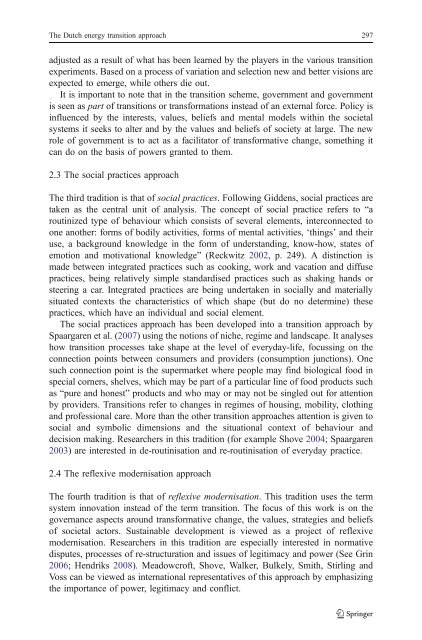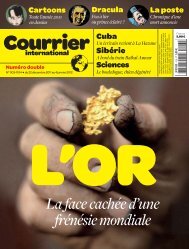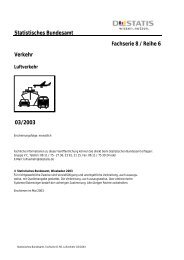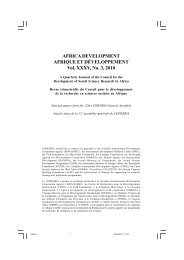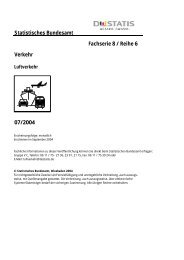The international economics of resources and resource ... - Index of
The international economics of resources and resource ... - Index of
The international economics of resources and resource ... - Index of
Create successful ePaper yourself
Turn your PDF publications into a flip-book with our unique Google optimized e-Paper software.
<strong>The</strong> Dutch energy transition approach 297<br />
adjusted as a result <strong>of</strong> what has been learned by the players in the various transition<br />
experiments. Based on a process <strong>of</strong> variation <strong>and</strong> selection new <strong>and</strong> better visions are<br />
expected to emerge, while others die out.<br />
It is important to note that in the transition scheme, government <strong>and</strong> government<br />
is seen as part <strong>of</strong> transitions or transformations instead <strong>of</strong> an external force. Policy is<br />
influenced by the interests, values, beliefs <strong>and</strong> mental models within the societal<br />
systems it seeks to alter <strong>and</strong> by the values <strong>and</strong> beliefs <strong>of</strong> society at large. <strong>The</strong> new<br />
role <strong>of</strong> government is to act as a facilitator <strong>of</strong> transformative change, something it<br />
can do on the basis <strong>of</strong> powers granted to them.<br />
2.3 <strong>The</strong> social practices approach<br />
<strong>The</strong> third tradition is that <strong>of</strong> social practices. Following Giddens, social practices are<br />
taken as the central unit <strong>of</strong> analysis. <strong>The</strong> concept <strong>of</strong> social practice refers to “a<br />
routinized type <strong>of</strong> behaviour which consists <strong>of</strong> several elements, interconnected to<br />
one another: forms <strong>of</strong> bodily activities, forms <strong>of</strong> mental activities, ‘things’ <strong>and</strong> their<br />
use, a background knowledge in the form <strong>of</strong> underst<strong>and</strong>ing, know-how, states <strong>of</strong><br />
emotion <strong>and</strong> motivational knowledge” (Reckwitz 2002, p. 249). A distinction is<br />
made between integrated practices such as cooking, work <strong>and</strong> vacation <strong>and</strong> diffuse<br />
practices, being relatively simple st<strong>and</strong>ardised practices such as shaking h<strong>and</strong>s or<br />
steering a car. Integrated practices are being undertaken in socially <strong>and</strong> materially<br />
situated contexts the characteristics <strong>of</strong> which shape (but do no determine) these<br />
practices, which have an individual <strong>and</strong> social element.<br />
<strong>The</strong> social practices approach has been developed into a transition approach by<br />
Spaargaren et al. (2007) using the notions <strong>of</strong> niche, regime <strong>and</strong> l<strong>and</strong>scape. It analyses<br />
how transition processes take shape at the level <strong>of</strong> everyday-life, focussing on the<br />
connection points between consumers <strong>and</strong> providers (consumption junctions). One<br />
such connection point is the supermarket where people may find biological food in<br />
special corners, shelves, which may be part <strong>of</strong> a particular line <strong>of</strong> food products such<br />
as “pure <strong>and</strong> honest” products <strong>and</strong> who may or may not be singled out for attention<br />
by providers. Transitions refer to changes in regimes <strong>of</strong> housing, mobility, clothing<br />
<strong>and</strong> pr<strong>of</strong>essional care. More than the other transition approaches attention is given to<br />
social <strong>and</strong> symbolic dimensions <strong>and</strong> the situational context <strong>of</strong> behaviour <strong>and</strong><br />
decision making. Researchers in this tradition (for example Shove 2004; Spaargaren<br />
2003) are interested in de-routinisation <strong>and</strong> re-routinisation <strong>of</strong> everyday practice.<br />
2.4 <strong>The</strong> reflexive modernisation approach<br />
<strong>The</strong> fourth tradition is that <strong>of</strong> reflexive modernisation. This tradition uses the term<br />
system innovation instead <strong>of</strong> the term transition. <strong>The</strong> focus <strong>of</strong> this work is on the<br />
governance aspects around transformative change, the values, strategies <strong>and</strong> beliefs<br />
<strong>of</strong> societal actors. Sustainable development is viewed as a project <strong>of</strong> reflexive<br />
modernisation. Researchers in this tradition are especially interested in normative<br />
disputes, processes <strong>of</strong> re-structuration <strong>and</strong> issues <strong>of</strong> legitimacy <strong>and</strong> power (See Grin<br />
2006; Hendriks 2008). Meadowcr<strong>of</strong>t, Shove, Walker, Bulkely, Smith, Stirling <strong>and</strong><br />
Voss can be viewed as <strong>international</strong> representatives <strong>of</strong> this approach by emphasizing<br />
the importance <strong>of</strong> power, legitimacy <strong>and</strong> conflict.


